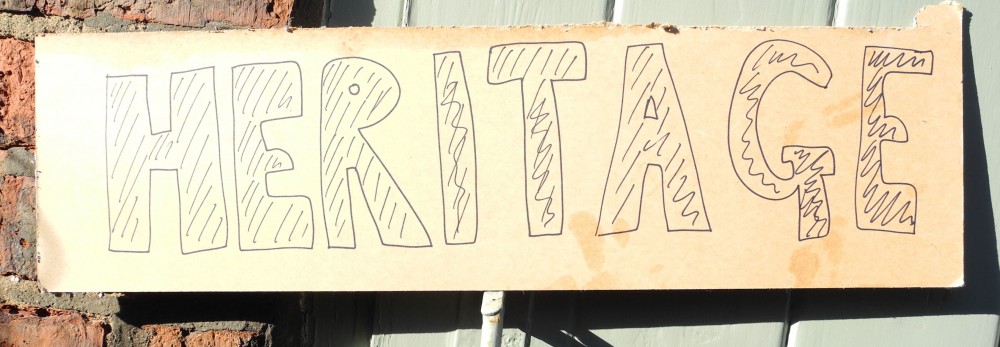Susan Ashley, 1 December, 2013
I would like to offer a belated reaction to the Heritage Decisions team’s admirable workshop in October about ‘what makes heritage decision-making difficult?’ In a way these ideas are also stirred by Gareth Hoskins’ excellent comments on ‘Decisions, Value, Power’, and Helen’s remarks on that posting.
I came away from the workshop thinking about the way that heritage was positioned as a ‘thing’ by many participants. Gareth’s opening comment questioning whether “heritage is good by default, that there should be more of it” made me realise that my perspective of what is heritage might not jibe with others’: how can I get ‘more’ heritage since I perceive it as a sensibility or consciousness or process of understanding my relation to the past?
So I will say a few words about my understandings of heritage, and also its relationship to ‘thingness’ which inevitably come up in the practical world of heritage management. The antithesis of heritage-as-thing is heritage-as-process. This could mean a process of understanding, or self-awareness, or relationship-building, or ‘making’, or valuation – in reference to ‘the past’. My memory of my granny in its complexity is part of my heritage. My sense of that nation where I lived most of my life is also part of my heritage. These sensibilities are not things, but might coalesce within objects or places as holders of impressions. Here is where the ‘ecology of signification’ comes in [for Martin] – my life personally and as part of community radiates a web of significance. This is Clifford Geertz’s idea, who wrote “man is an animal suspended in webs of significance he himself has spun, I take culture to be those webs, and the analysis of it … an interpretive one in search of meaning (Geertz 1973, 5).” Looked at differently, each heritage ‘thing’ – whether artefacts or buildings or places – bears this ecology of signification that infinitely stretches back in infinite variety and relationships.
Which makes me wonder whether we should stress making ‘decisions’ or whether to emphasize building ‘webs’ or ‘ecologies’ (e.g. Capra, 2002)? I know this sounds so idealistic, and I suppose it is. But this scenario might take us away from list-making towards processes of knowledge-building like community mapping, academic research and amateur research. This would emphasise the benefits of ground-up programmes like Heritage Lottery, or consciousness-raising through curricula, or even TV shows like Time Team more so than designations by the Secretary of State and English Heritage. I loved your idea, Helen, of devolved networks of care, knowing and passion. The ‘sticking points’ here will be vastly different and less project-oriented, but just as fraught, no doubt.
My desire to emphasise heritage-as-process comes from experiences at heritage sites and museums where I always wished the excitement and inspiration behind-the-scenes did not die when frozen in an exhibit or finite programme. The end-product is not where ‘heritage’ happens, but that talk, conflict, negotiation that occurs before hand when we bring our ideas to the table. Think of Helen’s heritage workshop and that raw stimulation that seemed impossible to capture in a brief ‘presentation’! Our systems want products not process, and our funding is skewed accordingly. I saw this reflected in one workshop participant’s comment that lively collaboration in a university research project was not accepted as a suitable topic for an academic research paper.
The theory part here (apologies): The act of making a decision suggests a frame of mind, an outlook, an episteme that emphasises and values closure. I am forever writing papers with titles like ‘ideas on…’ or ‘examining…’ that offer little closure. This must be maddening for some seeking more scientific conclusions, and certainly the antithesis of the aims of a workshop on decision-making. Nancy Fraser’s recent discussions about the public sphere and what is considered ‘normal’ discourse, point out that ‘closure’ — the need for argument then decision-making — employs taken-for-granted assumptions about the how of participation, as well as the what and the who. Fraser calls for a “new grammar” of public sphere participation (and justice) wherein self-problematising would be the aim. She argues that public sphere discourses would treat every ‘closure’ as provisional, and subject to question, possible suspension, and thus to re-opening to new claims about the what, the who, and the how. This entangles discourse-rational approaches [that’s our current technical system of heritage which hegemonically represents everyone] and agonistic approaches on the other [the quarrelsome or ‘abnormal’ realm of anyone else]. Your invocation of social movements here, Helen, and their decision-making processes (criticised by mainstream commentators as lack of decision-making), exemplifies this division between ways of seeing the world and how to participate in the public sphere.
Capra, Fritjof. (2002). The Hidden Connections. London: HarperCollins
Fraser, Nancy. (2007). Transnationalizing the Public Sphere: On the Legitimacy and Efficacy of Public Opinion in a Post-Westphalian World, Theory, Culture & Society Vol. 24(4): 7–30
Geertz, Clifford. (1973). The interpretation of cultures: Selected essays. New York: Basic Books.
